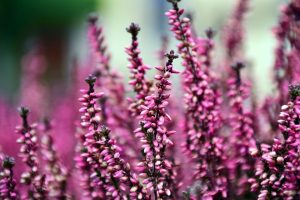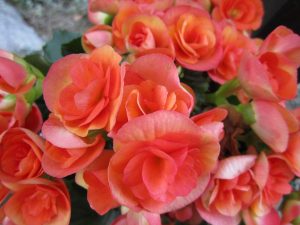Signs of spring are popping up everywhere in the Willamette Valley and there’s no time to waste!
Both your lawn and garden will require some love this month. One of the most important jobs a gardener can do is prep or amend soil. The Willamette Valley is known to have highly acidic soil, so fertilizing with
Nutri-Rich after winter rains to add nutrients as well as adding compost (like
Barnyard Compost or
Garden Compost) to break up the soil and aerate dense areas will allow for stronger root growth and overall plant health. Lawns will also need food this month after winter rains have depleted nutrients and because our ground is highly acidic, adding lime to balance the pH is also important.
Aside from fertilizing your garden, here are a few other quick tips for the month of March that will help keep your garden in pristine shape.
Flower Gardens

This is a good time to plant Roses. Bareroot varietals or potted roses are available in most garden centers. Roses love our
Blended Mint Compost either incorporated into the soil or used as a mulch.
Plant, divide, and transplant perennials.
Start control of blackspot on roses as their buds begin to break. Follow application and spray schedule instructions on the fungicide of your choice. Remove and dispose of any infected leaves.
As heathers finish blooming, prune/shear the plants to remove spent flowers.
Vegetable Gardens

Take the time to plan the layout of your garden. Thoughtful preparation and planting will yield fresh, healthy vegetables throughout the growing season. If space is limited, create a container garden on your deck or patio.
Plant cold weather vegetables such as spinach, peas, lettuce, and broccoli.
Sow radish and lettuce seeds.
Be sure to add fertilizer or
compost to fall planted bulbs like garlic to boost spring growth.
Fruit Gardens

Plant bareroot fruit trees and caneberries.
Feed caneberries (i.e. raspberries) with an application of
Blended Mint Compost. The manure it contains with provide nourishment to the plant and support berry production.
Add four-to-six inches of
Barnyard Compost or
Garden Compost to beds and work into soil.
Indoor Plants & Herbs
As with last month, fertilize as needed and clean leaves of dust. Re-pot as needed.
Prepare geraniums, begonias, and fuchsias for their removal from indoor winter storage. Clip off any dead growth, and cut them back as needed. Give them a good drink of water and fertilizer to encourage new growth. Next month they should be ready to move back outside.
Lawn Maintenance

As mentioned above, lawns will need food this month after winter rains have depleted nutrients. A good, slow release fertilizer like
All Season Plus with Iron and Humic Acid will do the trick.
March is a good time to apply Lime to balance out your lawn’s pH after a wet winter. We like Pro-Pell-It pelletized Lime.
Set your lawn mower to a higher-cut during the onset of spring.
Be on the lookout for European crane fly damage to your lawn. This time of year their larvae are in the soil munching on the roots of the grass. Treat lawns once their presence has been confirmed.
Various Jobs Around Your Oregon Garden

Turn your compost pile and protect it from becoming saturated with rain.
Fertilize rhododendrons, camellias, and azaleas as needed with acid-type fertilizer.
Shrubs that produce a spring flower can be pruned after blooms fade.
Sources:
LFP Website and
OSU Extension Service
 This is a good time to plant Roses. Bareroot varietals or potted roses are available in most garden centers. Roses love our Blended Mint Compost either incorporated into the soil or used as a mulch.
Plant, divide, and transplant perennials.
Start control of blackspot on roses as their buds begin to break. Follow application and spray schedule instructions on the fungicide of your choice. Remove and dispose of any infected leaves.
As heathers finish blooming, prune/shear the plants to remove spent flowers.
Vegetable Gardens
This is a good time to plant Roses. Bareroot varietals or potted roses are available in most garden centers. Roses love our Blended Mint Compost either incorporated into the soil or used as a mulch.
Plant, divide, and transplant perennials.
Start control of blackspot on roses as their buds begin to break. Follow application and spray schedule instructions on the fungicide of your choice. Remove and dispose of any infected leaves.
As heathers finish blooming, prune/shear the plants to remove spent flowers.
Vegetable Gardens
 Take the time to plan the layout of your garden. Thoughtful preparation and planting will yield fresh, healthy vegetables throughout the growing season. If space is limited, create a container garden on your deck or patio.
Plant cold weather vegetables such as spinach, peas, lettuce, and broccoli.
Sow radish and lettuce seeds.
Be sure to add fertilizer or compost to fall planted bulbs like garlic to boost spring growth.
Fruit Gardens
Take the time to plan the layout of your garden. Thoughtful preparation and planting will yield fresh, healthy vegetables throughout the growing season. If space is limited, create a container garden on your deck or patio.
Plant cold weather vegetables such as spinach, peas, lettuce, and broccoli.
Sow radish and lettuce seeds.
Be sure to add fertilizer or compost to fall planted bulbs like garlic to boost spring growth.
Fruit Gardens
 Plant bareroot fruit trees and caneberries.
Feed caneberries (i.e. raspberries) with an application of Blended Mint Compost. The manure it contains with provide nourishment to the plant and support berry production.
Add four-to-six inches of Barnyard Compost or Garden Compost to beds and work into soil.
Indoor Plants & Herbs
Plant bareroot fruit trees and caneberries.
Feed caneberries (i.e. raspberries) with an application of Blended Mint Compost. The manure it contains with provide nourishment to the plant and support berry production.
Add four-to-six inches of Barnyard Compost or Garden Compost to beds and work into soil.
Indoor Plants & Herbs As with last month, fertilize as needed and clean leaves of dust. Re-pot as needed.
Prepare geraniums, begonias, and fuchsias for their removal from indoor winter storage. Clip off any dead growth, and cut them back as needed. Give them a good drink of water and fertilizer to encourage new growth. Next month they should be ready to move back outside.
Lawn Maintenance
As with last month, fertilize as needed and clean leaves of dust. Re-pot as needed.
Prepare geraniums, begonias, and fuchsias for their removal from indoor winter storage. Clip off any dead growth, and cut them back as needed. Give them a good drink of water and fertilizer to encourage new growth. Next month they should be ready to move back outside.
Lawn Maintenance
 As mentioned above, lawns will need food this month after winter rains have depleted nutrients. A good, slow release fertilizer like All Season Plus with Iron and Humic Acid will do the trick.
March is a good time to apply Lime to balance out your lawn’s pH after a wet winter. We like Pro-Pell-It pelletized Lime.
Set your lawn mower to a higher-cut during the onset of spring.
Be on the lookout for European crane fly damage to your lawn. This time of year their larvae are in the soil munching on the roots of the grass. Treat lawns once their presence has been confirmed.
Various Jobs Around Your Oregon Garden
As mentioned above, lawns will need food this month after winter rains have depleted nutrients. A good, slow release fertilizer like All Season Plus with Iron and Humic Acid will do the trick.
March is a good time to apply Lime to balance out your lawn’s pH after a wet winter. We like Pro-Pell-It pelletized Lime.
Set your lawn mower to a higher-cut during the onset of spring.
Be on the lookout for European crane fly damage to your lawn. This time of year their larvae are in the soil munching on the roots of the grass. Treat lawns once their presence has been confirmed.
Various Jobs Around Your Oregon Garden
 Turn your compost pile and protect it from becoming saturated with rain.
Fertilize rhododendrons, camellias, and azaleas as needed with acid-type fertilizer.
Shrubs that produce a spring flower can be pruned after blooms fade.
Sources: LFP Website and OSU Extension Service
Turn your compost pile and protect it from becoming saturated with rain.
Fertilize rhododendrons, camellias, and azaleas as needed with acid-type fertilizer.
Shrubs that produce a spring flower can be pruned after blooms fade.
Sources: LFP Website and OSU Extension Service
